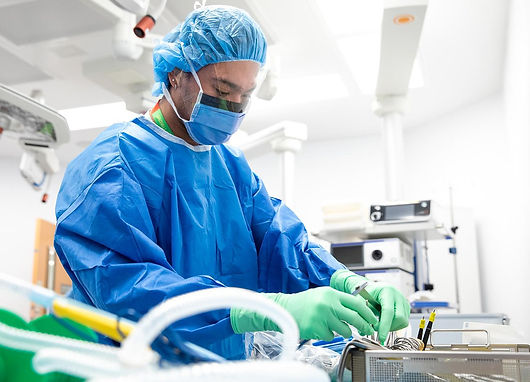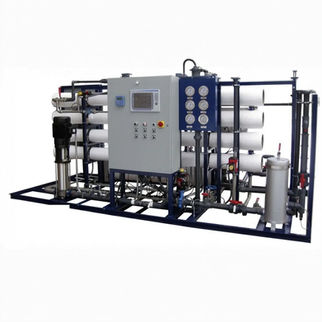
WaterCare for Hospitals
Protecting patients, ensuring safety, and optimizing operations through advanced water treatment solutions

Top 5 Water Treatment Solutions Every Hospital Needs
Healthcare facilities face unique challenges when it comes to water treatment. From ensuring the purity of water used in surgeries to managing wastewater, hospitals require reliable and efficient solutions. Here are the top five water treatment solutions essential for hospitals: Reverse Osmosis (RO) Systems: Reverse osmosis systems are vital for removing impurities, microorganisms, and dissolved salts from water. Hospitals use RO water in laboratories, for sterilization, and in dialysis units. UV Disinfection Units: Ultraviolet (UV) disinfection systems provide chemical-free sterilization, effectively eliminating bacteria and viruses from water. This is particularly important for drinking water and medical equipment cleaning. Water Softening Systems: Hard water can cause scaling in hospital equipment and pipes, leading to inefficiencies and increased maintenance costs. Water softeners remove calcium and magnesium, preventing scale buildup. Sewage Treatment Plants: Hospitals generate wastewater containing pathogens, chemicals, and other contaminants. Advanced STPs ensure safe disposal or reuse of treated water, protecting the environment and complying with regulations. Multistage Filtration Systems: These systems remove sediments, chlorine, and other contaminants from water, ensuring it meets the quality standards required for various hospital applications. Water Care Nepal specializes in providing these solutions, ensuring hospitals operate smoothly while maintaining the highest standards of water quality.

The Critical Role of Water Quality in Healthcare Facilities
Water is an essential resource in every hospital, playing a critical role in maintaining hygiene, supporting medical procedures, and ensuring patient safety. However, the quality of water used in healthcare facilities often goes unnoticed, despite its significant impact on operations and health outcomes. Hospitals require high-quality water for several purposes: Patient Safety: Contaminated water can cause severe health risks, especially for immunocompromised patients. Clean water is crucial for drinking, preparing medications, and surgical procedures. Sterilization and Cleaning: Medical tools, surgical instruments, and other equipment must be sterilized using purified water to prevent infections. Dialysis Treatments: Water used in dialysis must meet strict purity standards to avoid complications for patients undergoing treatment. HVAC Systems: Water quality affects the efficiency and safety of hospital HVAC systems, as untreated water can lead to microbial growth such as Legionella. Wastewater Management: Proper treatment of hospital wastewater is essential to prevent environmental contamination. Water Care Nepal provides tailored solutions for hospitals, including reverse osmosis systems, UV disinfection, and advanced wastewater treatment plants. These systems ensure that healthcare facilities meet regulatory standards and operate efficiently, safeguarding both patients and the environment.

Ensuring Compliance: Water Quality Standards for Hospitals in Nepal
Hospitals in Nepal are bound by stringent water quality standards to ensure the safety of patients and staff. Non-compliance can lead to severe consequences, including penalties, loss of accreditation, and compromised patient care. Key Water Quality Standards: WHO Guidelines: Hospitals must adhere to WHO standards for drinking water quality and water used in medical applications. Local Regulations: The Nepal government mandates specific guidelines for hospital wastewater treatment and disposal. ISO Standards: Many hospitals aim to meet ISO standards for medical-grade water used in laboratories and surgeries. Common Challenges: Inconsistent water supply quality. Lack of proper wastewater management systems. High costs of compliance for smaller healthcare facilities. Solutions by Water Care Nepal: Customized Water Treatment Systems: Tailored solutions to meet local and international standards. Regular Maintenance and Monitoring: Ensuring systems operate efficiently and consistently meet compliance requirements. Cost-Effective Wastewater Management: Advanced technologies to reduce treatment costs while maintaining high standards. By partnering with Water Care Nepal, hospitals in Nepal can achieve full compliance with water quality regulations, safeguarding their reputation and enhancing patient trust.

Reducing Hospital-Acquired Infections with Proper Water Treatment
Hospital-acquired infections (HAIs) are a significant concern for healthcare facilities worldwide. According to the World Health Organization (WHO), HAIs affect millions of patients each year, often leading to severe complications or prolonged hospital stays. One of the lesser-known contributors to HAIs is poor water quality. How Waterborne Pathogens Contribute to HAIs: Legionella: Found in untreated or poorly managed water systems, this bacterium can cause Legionnaires’ disease, a severe form of pneumonia. Pseudomonas aeruginosa: This pathogen thrives in moist environments and can contaminate water supplies, posing risks during surgeries and wound care. Escherichia coli (E. coli): Often associated with contaminated water, E. coli infections can lead to severe gastrointestinal issues. Solutions to Minimize Waterborne HAIs: Regular Water Quality Testing: Routine testing ensures that hospital water systems remain free from harmful microorganisms. Installation of UV Disinfection Systems: These systems eliminate pathogens without the use of harmful chemicals. Proper Maintenance of HVAC Systems: Ensuring that water used in cooling systems is treated prevents microbial growth. Wastewater Treatment: Efficient management of wastewater prevents contamination of the hospital’s water supply and surrounding areas. By investing in comprehensive water treatment solutions, hospitals can significantly reduce the risk of HAIs, ensuring a safer environment for patients and staff.





